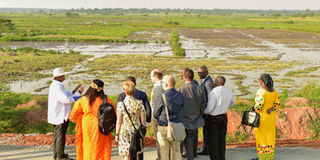Museveni warns over forceful eviction of wetland encroachers

Inspection. President Museveni (right) engages a group from the UN as they inspect restoration projects at Limoto wetland in Pallisa District on Thursday. He warned against forceful eviction of encroachers. PUU PHOTO
What you need to know:
- Mr Paul Mafabi, the country project coordinator of wetland restoration project, codenamed building resilient communities, wetlands ecosystem and its associated catchment, said a big part of Limoto wetland has been restored and about 300 people are benefiting from the restoration project.
President Museveni has warned authorities against forceful eviction of wetland encroachers across the country.
The President made the remarks while visiting Pallisa District on Thursday to check on small-scale irrigation schemes, fish ponds and other ecosystem restoration projects at Limoto wetland, which is under restoration.
The wetland that is located on Tirinyi-Pallisa road, is shared by the districts of Pallisa and Kibuku.
Although the President had earlier banned factories in wetlands and ordered Chinese investors to stop invading marshlands, in Pallisa District, Mr Museveni called for raising awareness before evictions are carried out.
“The solution is to sensitise and show the residents the importance of preserving the wetlands and they will voluntarily leave. Don’t fight with them because the NRM government doesn’t use force,” he said.
The wetland restoration project is being funded by the United Nations Development Programme (UNDP) in partnership with government and implemented under the water and agriculture dockets.
President Museveni commended the residents, who were growing rice in Limoto wetland for voluntarily vacating the area and allowing government to restore its ecosystem.
“The people of Limoto have set a good example, which others should emulate because it’s dangerous to turn wetlands into gardens for rice growing,” he said.
Wetlands serve as sponges and water filters in the eco-system. Experts have warned that if the degradation of wetlands is not checked, the country is headed for an ecological disaster that may lead to clean water shortages and flooding.
The President promised alternative sources of revenue in the fight against poverty. He talked about productive sources of livelihoods such as fishing and crop production through irrigation.
“One acre of rice can fetch a farmer about Shs700,000 but if a farmer has four fish ponds on one acre, he or she can fetch about Shs120 million annually,” the president said.
One person was shot dead this week and several others injured in Namanyonyi Sub-County in Mbale District as police battled with residents protesting against the ongoing demarcation exercise in Namakole wetland.
The demarcation of wetlands in the district, which started this week, was headed by Ms Evelyn Busingye, the programme officer of water and biodiversity and the police environmental officers for eastern region.
Some residents, however, refused to vacate the wetland, saying they had not been made aware of the importance of the project.
Mr Paul Mafabi, the country project coordinator of wetland restoration project, codenamed building resilient communities, wetlands ecosystem and its associated catchment, said a big part of Limoto wetland has been restored and about 300 people are benefiting from the restoration project.
He said similar projects have also been implemented in 24 benefiting districts across the country.
“We are also going to install early warning and weather information equipment in the benefiting districts,” he said.




